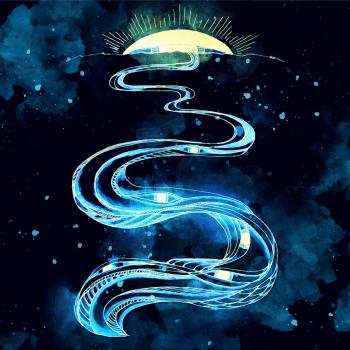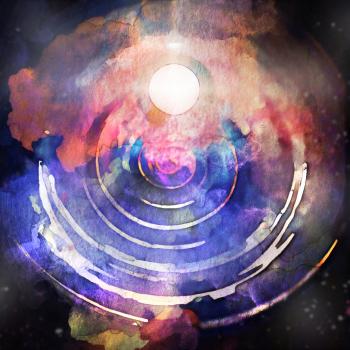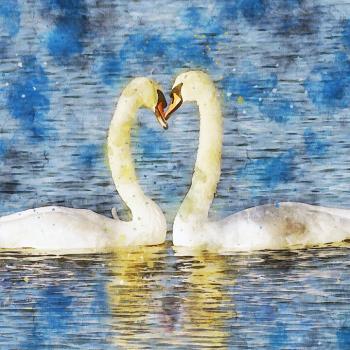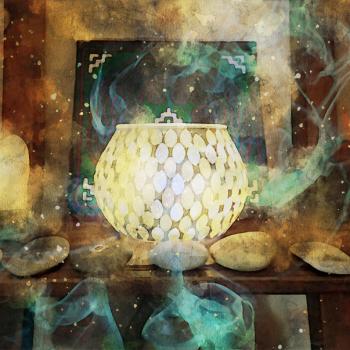Science and magic are seen as opposites these days, but that’s been the case for the last century. From the ancient Greek philosophers to the Medieval alchemists, to the Theosophist to the Spiritualists, people in the Western Magical Tradition have integrated scientific understanding and process into their magic and spirituality.
But why set up the false dichotomy?
Part of the reason is that science is for people in lab coats. It’s become something rarefied and obscure. We have to use the speed of light in our calculations to adjust our phone clocks so that they keep proper time. It literally takes high-level astrophysics to keep a clock working right. That’s some fancy equations and not something your average magician might want to tackle. But that’s okay. We can all be fans of our phones keeping proper and automatic time and still want to use scientific principles and understanding to make our magic better too. Science doesn’t just have to be for corporations and universities.
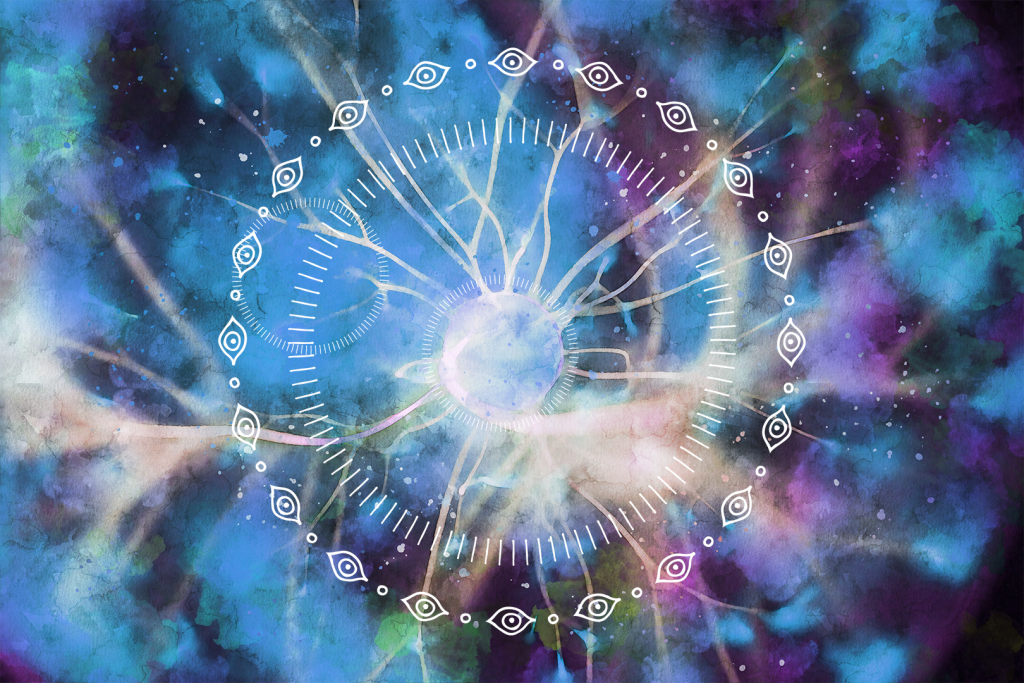
Make an observation
Honestly, if I could pick just one thing to have witches and animists do more of, I’d have them observe the world. This is a thing that artists and scientists have in common. To really attempt to see is a huge challenge. We see things as we want to see them. We have bias, assumptions, shortcuts, and blind spots. People look at a wild city lot and just see undifferentiated “weeds” because they don’t know how to identify yarrow, evening primrose, goldenrod, or bergamot. We don’t notice that the wind is behaving strangely because we don’t know how rarely it comes from the north-east. When you don’t know the call of the eagle on TV is actually the call of the red-tailed hawk, you can’t properly identify the bird. You can only see poison ivy if you know how to see the sheen on the leaf and the redness of the stem. Once you know what to look for, it’s unmistakable and you will never again wonder if black raspberry (serrated leaves, purple/white stems with thorns) is the same plant.
Practice your lookingness.
If you want you can get phone apps or National Audubon Society Field Guides and really start the identification process. If you intend to harvest you’re going to need to. However, as a magician or witch, it’s worth it to come into a healthier relationship with the non-human-beings who populate this planet. At least at first no ID books are necessary unless you want them. Sketch the non-human species if you’d like, or take photos, or just get up close and notice how the leaf meets the stem. If there’s a lot, maybe pull one up and look at the root system. Note where it likes to live, who lives near it, when it blooms, what insects like it.
You’ll note that a lot of what I suggest is about plants. That’s because they hold still. They’re easy to observe because they don’t run/swim/fly away. If you start with observing plants you’ll get pulled into all the other kingdoms as well. Plantae will lead to Animalia, and Fungi will just sneak up on you and pop up when you least expect them to. If you start with the plants, you’ll find your non-human friends everywhere, and looking for them means your eyes are in the right spot to see all kinds of other friends.
Ask a question with Science and Magic
In elementary schools and graduate-level science programs the goal is the same: come up with a question about reality. Questions are how we make discoveries. They’re how the internet, toilet paper, and Tencel exist. The thing is, we don’t really seem to ask the right questions in magic. We ask, “How do I do a love spell” and often we mean, “How have other people, in other cultures and times done a love spell?” so we can copy what they did. That’s history research and is very cool, and can unearth a lot of neat stuff. In the case of love spells you can learn how to make some serious breaches of consent, particularly in the Roman works. Can’t say I recommend Roman love spells. That’s not the kind of question we’re talking about here. We’re looking for questions that help us understand the underlying rules, mechanisms, and processes of magic.
- Why does a thing do what it does?
- Why does water connect us to emotion?
- Why do heart shapes tie into love?
- Why are we building spells to make other people love us when we know we probably ought to be making spells so that we love ourselves?
I’m just spitballing here. No judgment. Seriously though, it’s worthwhile to take some time and ponder even if the only person you can answer the question for is you. Why is candle magic so effective? What is it about flame that just makes humans get into the magical groove? What herbs that live in your yard are the best for a love spell? What tarot cards would make a great visual focus for a spell like that?
There are literally infinite questions one can ask about magic. The most important thing is to start getting used to the idea that asking questions is good, and seeking answers for yourself is even better.
Form a Hypothesis, or Testable Magical Prediction
This is where magic and science are the same damn thing because it’s all about making shit up.
A hypothesis is a guess, it’s where a person, who knows a lot about how a specific thing works (scientist/magician) makes a guess at what might happen. This comes from observation of the world and then asking questions about the world. We do this ALL THE TIME. We look in the rearview mirror and see a car swerving a little bit and speeding up. We hypothesize that they’re going to try and whip around us and cut us off. We make educated guesses about the world constantly. But most of the time we don’t carefully write down our guesses and test them over and over again. This is where the magician can take a few tips from the scientist.
Test your Magic with Science
So you’ve observed some stuff, maybe how ghosts work, or that love spells work really well when done on a full moon during a weekend, or that ancestors really like coffee. Now you can start to test that prediction. First off: keep records. Your book of shadows is going to be so cool because you’re going to have so much to write down! You’ll want to note as much data as you can and as many factors as you can. I recommend jotting down:
- date, including the day of the week
- tools used
- weather
- predominant wind
- time of day
- moon phase
- other astrological info of note such as eclipses or if mercury or venus is retrograde
- your mood
- the target of the spell, ritual, or invocation
After you’ve performed your spell, ritual, or invocation, write down how it felt, what happened, and maybe even do a bit of divination and jot that down too. Then put everything away, and set it aside to let the magic do its work. The most important part here is to faithfully write down as much honest information as you can. This is only for you, so be honest if you need to record that you almost burned your braid off leaning over a candle to reach a spell component (Yes, I did actually do that.)
Iterate and Replicate your Scientific Magic (AKA Try It More Than Once):
One of the most important parts of the scientific process is replicability. You can repeat the experiment and get the same outcome. Now with magic, this is a little more higglety-piggelty-timey-wimey because we’re often working with subtle probability and placebo effects. We can still learn a lot from trying something more than once. Just like a favorite recipe in a cookbook you probably have your tried and true spells. Why does it work so well? This is where covens and networking groups can be super useful in the work if they’re willing to try and replicate a spell and see if it works for them too.
Each time you do a spell is an opportunity to tweak it and make it even better. Align your symbology more deeply with your own personal cosmology. Tweak the way you dress the candle or the incense offerings and see what happens.
Some Last Thoughts on Incorporating Science and Magic
For Eurotrad pagans, witches, and spiritual practioners, we are faced with the challenge of traditions that have been bent toward Christianity for centuries. Like a tree that has been heavily pruned, we still have traditions, but the shape of the tree is far from whole, and vast amounts of knowledge are lost forever. So then many of us dive deeply into reconstructionism, doing exactly what the ancients did, or trying to. Others make up stories that suit them some with more honesty than others. In the assessment of what we have, what we can build on to find a meaningful path toward spirit and connection it has felt rather dire to me. It was really reading Robin Wall Kimmerer’s Braiding Sweetgrass and To Speak for the Trees by Diana Beresford-Kroeger that got me inspired to start incorporating my scientific understanding of the world into my magic and spirituality again. Pagans are big on anthropology, sociology, and psychology. Maybe we should also remember botany, chemistry, ecology, and physics. The hard sciences can be our friends too.
If you like my writing and you’d like to support it, please consider joining my Patreon. In the next year I will be transitioning to only blogging there, so please consider joining so we can stay in touch.


